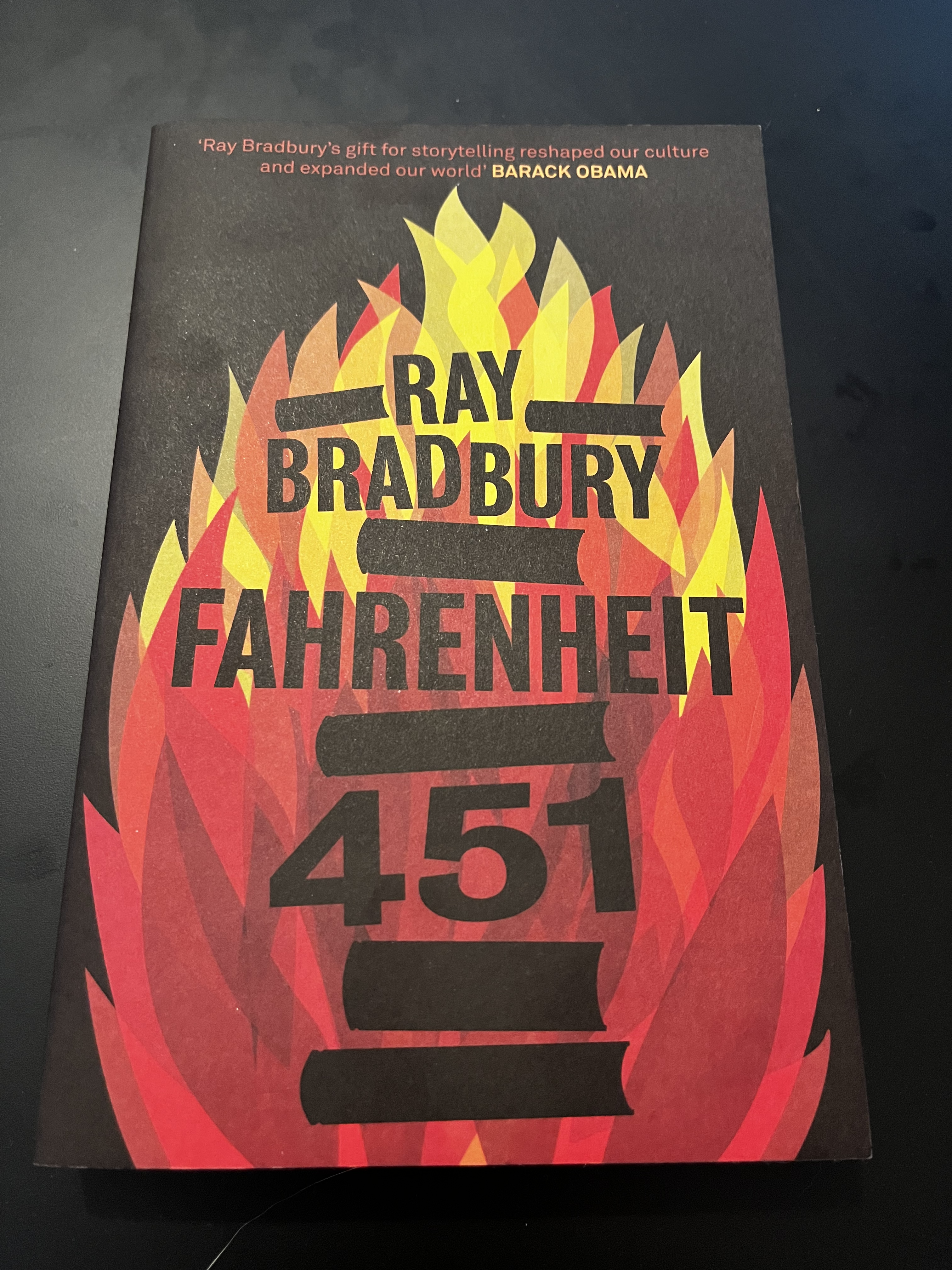This one has been on my virtual bookshelf for quite some time. I even have a physical copy that I bought, as I tend to do with physical books, with the greatest intentions of reading it immediately, but it very quickly gathered dust on my shelf. I’m a big fan of the cover, for its vibrant colours but minimal look. It’s not the best Fahrenheit 451 cover I’ve seen – there’s a fantastic all-black one that reveals the title only when you heat/burn the page – but still, I enjoyed it.

The book itself is an interesting one. I finished it last night and yet I’m still not sure what I really feel about it. Perhaps I’ll have a better idea by the end of this article. But it’s a classic. It has won dozens of awards, and is lauded by critics. Of course it’s for those reasons that I picked it up to begin with, but now that I’ve read it I’m not so sure. I certainly enjoyed it but not quite to the extent that I expected to.
The book follows Guy Montag, a fireman responsible not for putting fires out, but for setting fire to books and houses and sometimes the people who get in the way. Set in a dystopian future full of book burning, censorship, mechanical manhunting dogs, and a placid population glued to their parlour screens, the book paints a picture of a society with scary parallels to our own. It’s even scarier writing this in 2022, when the book was written seventy years ago! There is exploration of the consequences of book burning and censorship, of widespread hedonism, of the bystander effect. One character asks why you’d ever want to read a book because it’ll challenge your perspective and make you miserable. It’s fascinating and scary and almost too relatable.
However.
The way it explores this is in long monologues and dialogue between characters, and it comes across as a little too on the nose. It’s hitting you over the head with it for much of the book, and everything else, where there are consequences for the actions of the characters, feels rushed and simple in comparison. It’s a book that is standing on a soap box and making a point, and it’s an exceptional point to make, but not one that lends itself to a deep and enjoyable read.
However.
The writing itself is incredible, and I think I’ll reread it a second time just for a closer understanding of what makes the writing so good. The first time I picked this book up, I was put off by the language and dialogue because it felt to me a little too airy and loose, particularly right at the start when Montag’s world view is challenged by his neighbour, Clarisse. But I realise, that’s sort of the point. It demonstrates Montag’s confusion, and how distinctly different the two people are in both how they see and react to the world around them. But Clarisse becomes the spark that ignites1 the change in Montag. There are few wasted words throughout the entire book, everything has its place, everything is saying something.
The dialogue is really tight as well. I particularly enjoyed the conversations between Montag and his wife Mildred. They are often mundane to the nth degree, but it describes this disjointed relationship where she’s not really paying attention to what he’s saying, and he’s frustrated that she’s not listening to his revelations about his life or his job. They’re having two different conversations, at each other, without the other even realising. It’s frustrating and awkward, but again it reinforces that disconnected society, everyone in their own little world, their eyes closed only focussing on the least challenging information they can deal with.
Unfortunately the end felt a little rushed and I finished the book wanting a little more. There’s so many questions about what’s going on in the universe and what’s going to happen afterwards. From the point Montag leaves Faber’s house for the first time it feels like Bradbury was racing towards the end, which is a shame because there are some incredible scenes dispersed amongst the rest. Perhaps this demonstrates the trade off of avoiding lots of exposition about the world and the situation? You get these small nuggets of insight into the society and the world, but you leave with more questions. I’m unsure how I feel about it. I don’t think I want answers to everything, but maybe a little more exposition could help.
Overall I enjoyed the book, and I’m glad I read it. It has long been on my reading list and there’s nothing quite as good as the hit of dopamine from drawing a thick black line through an item on that list. It is also the book that has taken me away from my beloved audiobooks and instead back to the “real thing” (if a Kindle can be called a real book,) and that’s got to be a good thing.
-
I had to get a pun in there somewhere. ↩︎